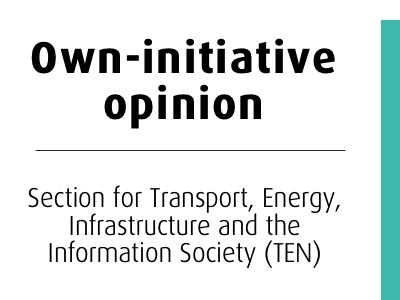European Economic
and Social Committee
Planning sustainable urban mobility in the EU
Background
In this own-initiative opinion, the EESC deals with Sustainable Urban Mobility Plans (SUMPs) as a powerful tool to enhance mobility while addressing the negative impacts of transport on society, health, and the environment.
More specifically, the opinion explores the current state of SUMP implementation, highlight tools to support Member States and local authorities, and emphasise the importance of financial, organisational, and participatory resources in developing effective plans.
Planning sustainable urban mobility is a top challenge for cities, especially given financial constraints. Local authorities must balance competing priorities such as ensuring a high quality of life, fostering social inclusivity, and creating a thriving business environment.
Key points
- To improve urban mobility and reduce its environmental impact, we must develop Sustainable Urban Mobility Plans (SUMPs). The EESC calls on Member States to develop national programmes to assist local and regional authorities with development and implementation of SUMPs through guidance, capacity building and funding, and on the Commission to support the continuation and expansion of CIVINETs
- SUMPs are key for balanced regional development. Mobilising region’s creativity and social capital is a vital step; organisations of employers, workers and civil society organisations have a key role to play and must be encouraged to contribute to this dialogue. It is important to involve all relevant stakeholders at local, national and EU level in planning, including in cross-border issues
- As we plan for ‘urban’ mobility, we must consider that the social and economic life of urban areas extends well into suburban, peri-urban and rural areas, and that their views and needs must be taken into account. Lack of efficiency in the mobility system creates and sustains the urban-rural divide and its negative economic, social and political implications. Fairness of the mobility system means that mobility is affordable and does not create privileges that support those who are already in a better position.
Additional information
Section: Transport, Energy, Infrastructure and the Information Society (TEN)
Opinion number: TEN/849
Opinion type: Own-initiative
Rapporteur: Lidija Pavić-Rogošić (Group III - Croatia)
Co-rapporteur: Mateusz Szymański (Group II - Poland)
Date of adoption by section: 27 May 2025
Result of the vote: 72 in favour, 0 against, 0 abstentions
Date of adoption in plenary: 18-19 June 2025
Result of the vote: 111 in favour, 1 against, 3 abstentions
Contact
Marco Pezzani
Press Officer
Tel.: +32 2 546 9793 | Mob: +32 470 881 903
E-mail: marco.pezzani@eesc.europa.eu
Maja Radman
Administrator
Tel.: +32 546 9051
E-mail: maja.radman@eesc.europa.eu
